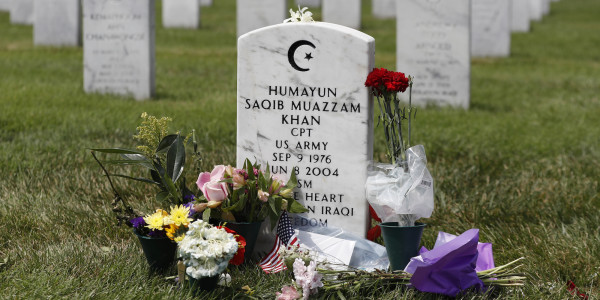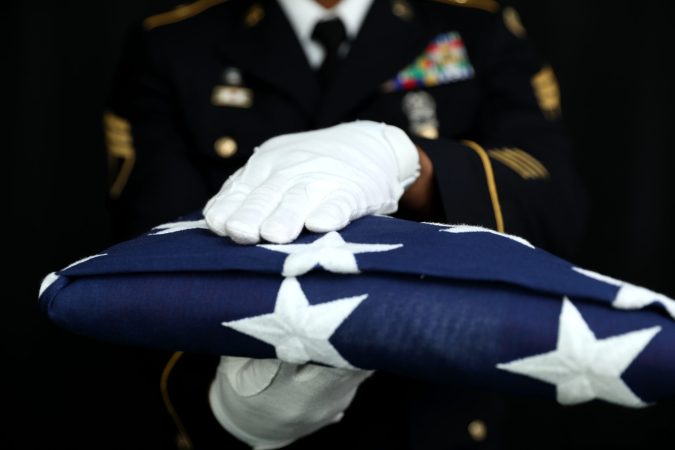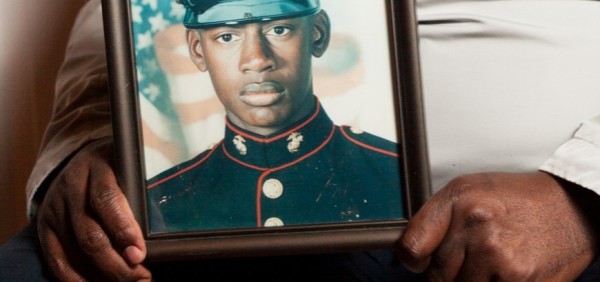An Army reservist who bilked Gold Star families out of almost $10 million often targeted grieving mothers and wives with minimal financial literacy and who spoke little English, the lawyer representing the families told Task & Purpose.
New Jersey Army Reservist, Caz Craffy, also known as Carz Craffey, admitted this week to defrauding Gold Star families when he tricked them into putting $10 million into an investment scheme, lost $3.7 million of it on risky financial bets, and kept $1.4 million for himself, according to the Department of Justice. Craffy admitted to federal prosecutors on Tuesday that he targeted families who received large cash compensations after on-duty deaths of soldiers and convinced them that the financial investments were approved by the Army.
“I believe the victims, the majority being female dependents of the deceased service members, were targeted by Caz Craffy,” said Natalie Khawam, a lawyer representing more than a dozen Gold Star families caught up in Craffy’s scams. “It’s horrific that he took advantage of their lowest, most vulnerable moments knowing they were naive regarding the financial fraud that he engaged in,” Khawam said.
It was “easy” to manipulate women who didn’t have financial literacy, she said, adding that “a lot of them, they couldn’t even read the financial statements.” One of the families Khawam represents are undocumented immigrants, she said.
The number of fraud cases connected to Craffy is expected to grow, Khawam said, adding that some families who originally reached out didn’t want to join the legal case for fears of retaliation if Craffy was found innocent in the criminal case. There are more than two dozen instances of fraud attached to the DOJ case, she said.
Khawam also questioned if a single person could pull off the scheme by himself without other Army officials at least turning a blind eye.
“I think there’s some blood on the hands of the Army,” she said. “Why was the base allowing him to use a military vehicle? Why was the base promoting him? I wonder whether there was a kickback here.”
A request for comment sent to the Army’s Criminal Investigation Division was not immediately returned.
“[Department of Defense] financial counselors are a critical resource especially for our gold star families after the death. That’s why Mr. Craffy’s crimes are so shocking,” said Mikie Sherrill (D-New Jersey). “A DOD civilian, a reservist himself, had taken advantage of Gold Star families in New Jersey when he had been placed in a position of trust. While these families were grieving, he was misusing their funds.”
In one of her cases, Caffy took advantage of the family within 24 hours of the family grieving the loss of their loved one by telling them they didn’t know how to take care of the money and it was safer in his possession.
“They were telling people, ‘Oh you can’t be trusted with this money. You have to make sure it’s financially protected before we give it to you,’” she said.
It’s unclear how much, if any, money the families will get back, Khawam said.
Khawam is no stranger to representing military families in high profile cases involving official wrongdoing. She represented the family of Vanessa Guillen, a soldier who was murdered in her unit’s armory room at Fort Hood by a fellow soldier.
Closing a loophole
Khaham spoke with reporters on Wednesday along with two U.S. lawmakers who are both military veterans. Rep. Sherrill and Rep. Don Bacon (R-Nebraska) worked to pass measures last year to close an accountability loophole in the military’s system of financial advisors that Craffy was able to exploit. The measure was added to the National Defense Authorization Act which became law.
After the case came to light from reporting by the Washington Post, the two helped pass the Protecting Our Service Members and their Families from Predatory Financial Practices Act. The Act requires the Department of Defense to develop a verification process for financial counselor’s annual disclosures for greater accountability.
“The bill itself is making sure that these people are vetted for no conflicts of interest,” Sherrill said Wednesday. The legislation aims to prevent DOD financial advisors from self-dealing and “making sure that the investments that they’re making will actually benefit families that they’re serving.”
“This certainly, I think, puts in place the means for what should have been a routine check of backgrounds and what they were doing now,” Sherrill said. “Like any law, there are people that will try to evade it and we’re hoping to put the means in place for quality background checks.”
Subscribe to Task & Purpose today. Get the latest military news and culture in your inbox daily.
Officials said they were unaware of a pending legal case with the Uniformed Code of Military Justice. However, Bacon said as a former base commander, “I have a hard time believing there wasn’t some way that there could be also UCMJ. He surely shouldn’t retire in rank.”
Guilty plea
Craffy was charged with six counts of wire fraud and one count each of securities fraud, making false statements in a loan application, committing acts affecting a personal financial interest, and making false statements to a federal agency. He faces 20 years in prison and fines of up to $5 million, according to the Department of Justice.
Craffy was an Army Reserve major and civilian Army employee from Colts Neck, New Jersey who held three jobs at once. As an Army civilian and a major in the reserves, Craffy held roles as a financial and benefits counselor for families who received Army benefits. He worked with Gold Star families after the sudden, unexpected deaths of their family members and were thrust into the Army’s benefits world. As they grieved, the families relied on Craffy for advice, according to court documents.
Meanwhile Craffy held a third, illegal position that he did not disclose to the families or the Army, working with two separate financial investment firms. Craffy “admitted to encouraging the Gold Star families to invest their survivor benefits in investment accounts that he managed in his outside, private employment,” according to the DOJ.
The cases involved service members who died while on active duty – some who committed suicides, others who were in accidents, Khawam said.
When a U.S. service member dies while on active duty, their beneficiary is entitled to a $100,000 “Death Gratuity” and servicemember’s life insurance of up to $400,000. To facilitate the payment process, the military provides several services to the beneficiaries’ family, including financial counseling.
While in his financial counseling role, Craffy obtained $10 million from families between May 2018 to November 2022 in his private investment capacity. Once in control of the families’ money, Craffy executed trades, often without their knowledge, which earned him high commissions. Gold Star families lost more than $3.7 million, while Craffy earned more than $1.4 million in commissions.
Craffy’s sentencing is scheduled for Aug. 21, 2024. The U.S. Securities and Exchange Commission (SEC) also has a pending civil complaint against Craffy.
The latest on Task & Purpose
- The Marines trolled the Navy on Instagram and it was awesome
- Kadena Air Base shows off new air power with an ‘elephant walk’
- Army Special Forces students are learning Ukrainian in new language course
- U.S. Army Vet and Ranger school graduate killed fighting in Ukraine
- Former Navy SEAL under fire for gunshot wound story used in campaign for Senate

























